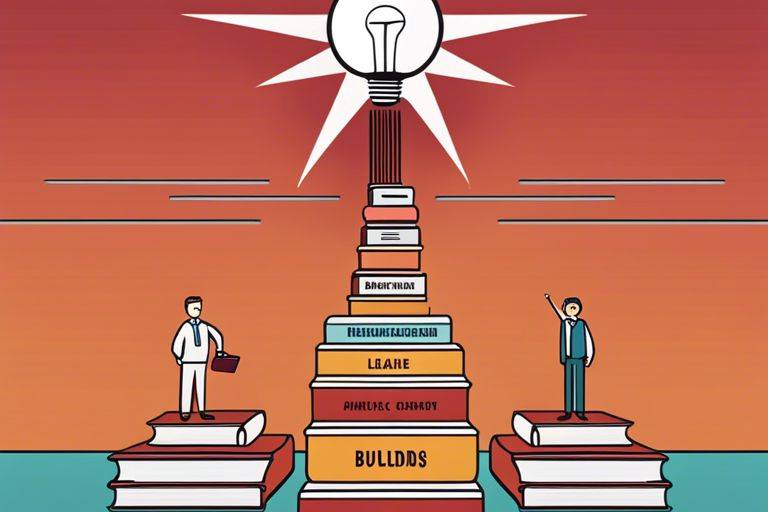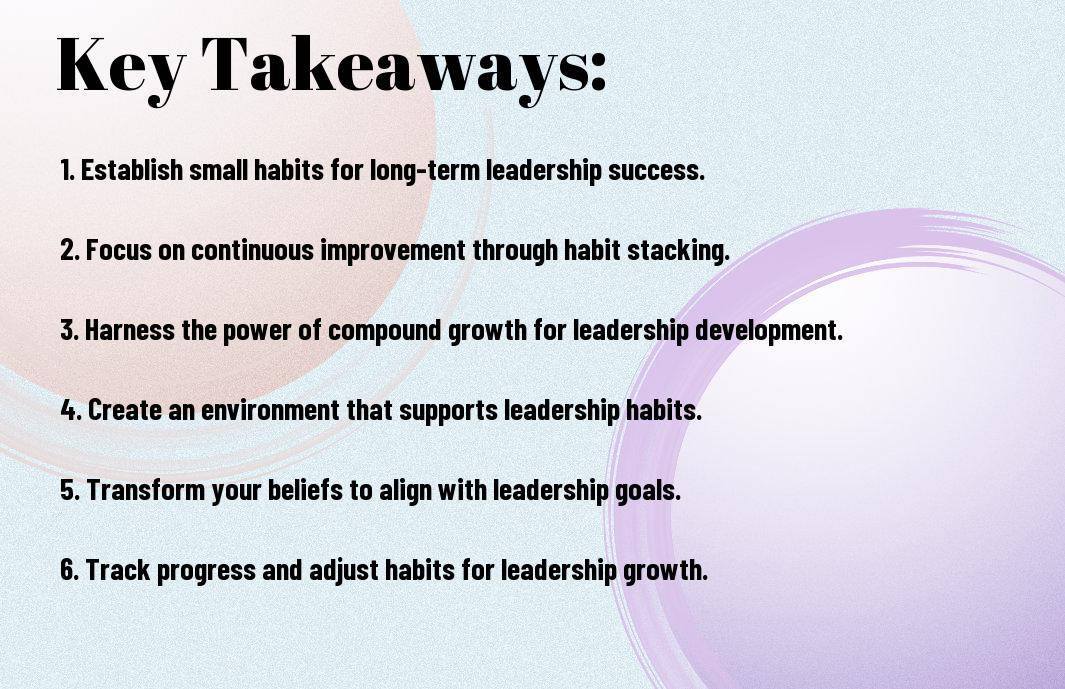
Newsletter Subscribe
Enter your email address below and subscribe to our newsletter

Enter your email address below and subscribe to our newsletter

There’s a powerful connection between leadership skills and the habits we cultivate in our daily lives. In his book Atomic Habits, author James Clear investigates into how small changes in habits can lead to remarkable transformations in our abilities as leaders. By understanding the principles outlined in Atomic Habits, leaders can enhance their effectiveness and impact within their organizations. In this article, we explore how Atomic Habits by James Clear can revolutionize your approach to personal development. Learn how building leadership skills with habits can transform your effectiveness as a leader and inspire those around you.

Little changes can lead to big results when it comes to building effective leadership skills. In his book ‘Atomic Habits’, James Clear introduces the concept of making tiny changes to daily routines to achieve remarkable outcomes. Understanding these atomic habits is key to unlocking your potential as a leader.
One sunny afternoon, I found myself struggling to motivate my team. The usual pep talks and incentives weren’t cutting it. That’s when I stumbled upon James Clear’s Atomic Habits. It wasn’t just another self-help book; it was a revelation. I started with tiny habits, like dedicating the first 10 minutes of my day to planning and reflection. Slowly, these small changes began to transform not just my leadership style but my entire team’s dynamic. Let me guide you through how you, too, can weave these atomic habits into the fabric of your leadership skills. It’s not about the big leaps; it’s the small, consistent steps that lead to peak leadership performance.
Atomic habits are small changes that compound over time to create significant results. By focusing on making consistent, incremental improvements, individuals can harness the power of habits to drive personal growth and leadership development. Research shows that habits are formed through a loop of cue, craving, response, and reward, making them ingrained in our daily lives.
Atomic habits revolve around the idea of making small changes that are easy to implement but have a significant impact over time. Key principles include creating systems that support good habits, focusing on identity-based habits to align actions with values, and embracing the idea of continuous improvement. These principles can help individuals cultivate effective leadership skills and achieve their goals.
Behind every successful leader are the atomic habits that shape their behaviors and actions. By understanding and applying the key principles of atomic habits, individuals can transform their routines and mindset to become more effective and impactful leaders in their personal and professional lives.
Drawing on James Clear’s leadership principles, we’ll guide you through creating a roadmap to effective leadership development strategies.
Many aspiring leaders aim to build effective leadership skills that can propel their careers and teams to success. To lay a strong foundation for leadership development, it is crucial to focus on key components such as self-awareness, emotional intelligence, and effective communication.
Leadership starts with self-awareness, which involves understanding your strengths, weaknesses, values, and goals. By being self-aware, you can identify areas for improvement and leverage your strengths to inspire and guide others effectively. Developing a clear personal vision allows leaders to align their actions with their values and long-term objectives, setting a solid framework for decision-making and leading by example.
Emotional intelligence and communication are vital pillars of effective leadership. Leaders with high emotional intelligence can navigate complex team dynamics, resolve conflicts, and motivate others with empathy and understanding. Effective communication ensures that the leader’s vision is understood and embraced by the team, fostering collaboration and trust.
Leaders who excel in emotional intelligence are adept at recognizing and managing their emotions, as well as understanding and influencing the emotions of others. They can build strong relationships, inspire loyalty, and drive performance by leveraging effective communication skills to connect authentically with their teams.
After understanding the importance of habits in shaping leadership skills, the next step is to identify and cultivate core leadership habits. Identifying these habits involves reflecting on your strengths and areas for improvement as a leader. Cultivating them requires conscious effort and practice to develop new habits that align with effective leadership.
Habits play a crucial role in shaping leadership behaviors as they are the building blocks of consistency and success. The establishment of daily routines supports the development of leadership skills by providing a structured framework to practice and reinforce desired behaviors on a regular basis. Leaders can use daily routines to create opportunities for self-reflection, skill enhancement, and team building.
Role: Daily routines help leaders stay organized, focused, and effective in their roles. By incorporating specific leadership-related tasks and activities into their daily schedules, leaders can enhance their ability to communicate, make decisions, and inspire others. Consistency in daily routines reinforces the behavior patterns that are important for effective leadership over time.
Unlike what many people might think, your environment plays a crucial role in shaping your habits and behaviors. By setting up your environment for success, you can make it easier to develop effective leadership skills. In this chapter, we will explore how you can structure your physical workspace and create a supportive network and social environment to enhance your leadership journey.
Your physical workspace significantly impacts your productivity and focus. To set yourself up for success, consider decluttering your desk, organizing crucial materials within easy reach, and creating a tranquil environment that promotes concentration. Ensure your workspace reflects your goals and values, with inspiring elements like motivational quotes or images. By optimizing your physical environment, you can cultivate a space that nurtures your leadership development.
Social connections play a vital role in leadership growth. Surround yourself with individuals who inspire and challenge you to reach your potential. Build a network of mentors, colleagues, and friends who support your leadership aspirations. Engage in meaningful conversations, seek feedback, and participate in networking events to broaden your perspective and enhance your leadership skills. Your social environment can be a powerful source of motivation and encouragement on your leadership journey.
This supportive network can offer valuable insights, guidance, and new opportunities that can propel your leadership development forward. By surrounding yourself with positive influences and cultivating strong relationships, you create a foundation for continuous growth and success in your leadership endeavors.

Once again, welcome back to our discussion on building effective leadership skills with Atomic Habits. Leadership is a journey that comes with its fair share of challenges but staying committed to your habits is key to overcoming them.
Habits play a crucial role in the development of leadership skills. To stay committed, make your habits as specific and measurable as possible. Tracking your progress and celebrating small wins along the way can help maintain your motivation. Additionally, consider finding an accountability partner or joining a leadership development group to keep you accountable and motivated.
Commitment to your leadership habits can be tested when facing obstacles and setbacks. It’s important to remember that setbacks are a natural part of the process and not a reflection of your abilities. When faced with challenges, take a step back, reassess your goals, and adjust your approach if needed. Remind yourself of the bigger picture and the impact your leadership habits will have in the long run.
When dealing with obstacles, it’s crucial to have a growth mindset and view challenges as opportunities for learning and growth. Embrace resilience and perseverance as you navigate through setbacks, knowing that each challenge you overcome will only make you a stronger and more effective leader in the end.
Now, as we explore deeper into building effective leadership skills with Atomic Habits, it’s important to measure progress and make adjustments along the way. For a comprehensive guide on how to apply Atomic Habits to business, check out How To Apply Atomic Habits To Business. This resource can provide valuable insights on incorporating Atomic Habits principles into organizational leadership practices.
Leadership tools and techniques for tracking leadership development are crucial in ensuring continuous improvement. Utilizing tools like performance evaluations, feedback surveys, and self-assessment can provide valuable insights into areas for growth and development. By tracking progress over time, leaders can identify patterns, areas of strength, and opportunities for improvement.
Any effective leadership development journey involves consistent reflection and adjustment. Taking the time to reflect on past experiences, challenges, and successes allows leaders to gain valuable insights and learn from their experiences. By adjusting practices based on feedback and lessons learned, leaders can adapt and grow in their leadership roles.
Tools for reflection, such as journaling, peer coaching, and mindfulness practices, can help leaders gain clarity and develop a deeper understanding of their leadership style. These tools enable leaders to reflect on their actions, behaviors, and decisions, leading to continuous growth and improvement in their leadership skills.
To effectively lead a team, it’s imperative to incorporate the principles of Atomic Habits into your leadership approach. By setting a positive example and fostering a culture of habit development within your organization, you can empower your team to reach new levels of success.
Team leaders play a crucial role in shaping the habits of their team members. As a leader, your actions speak louder than words. Demonstrating consistent and effective habits in your own work can inspire and motivate your team to do the same. Whether it’s showing up on time for meetings, maintaining open communication, or setting and achieving goals, your habits will set the tone for the entire team.
Example, imagine implementing daily stand-up meetings to encourage accountability and progress tracking. These brief check-ins can help team members establish a routine of sharing updates, setting priorities, and supporting each other’s goals. Creating a culture that prioritizes habit development can lead to increased productivity, collaboration, and overall team satisfaction.
The journey to building effective leadership skills with Atomic Habits is a transformative one. By understanding how small changes can lead to significant outcomes, leaders can adopt new habits that will propel them to success. Through the power of creating systems, staying consistent, and continuously improving, leaders can make strides in their personal and professional growth.
The combination of leadership principles and habits outlined in Atomic Habits paves the way for authentic and impactful leadership. By focusing on continuous improvement, using habit stacking, and implementing the 1% rule, leaders can build a strong foundation for success. Through deliberate practice and commitment to growth, leaders can cultivate habits that will lead them to become effective and inspiring leaders in any field.
A: Building effective leadership skills is important because they help you inspire and motivate teams, make better decisions, and drive positive change within your organization.
A: Atomic Habits provide a framework for creating small, incremental changes that can lead to significant improvements in your leadership abilities over time.
A: Key habits that can enhance leadership skills include setting clear goals, practicing effective communication, seeking feedback, and continuously learning and growing.
A: Consistency in habits builds trust, reliability, and credibility, which are necessary traits for effective leadership. It also helps reinforce positive behaviors and make them more automatic.
A: Building effective leadership skills with Atomic Habits can benefit a team by fostering a positive work culture, improving team performance, and creating a sense of direction and purpose.
A: Self-awareness is crucial in leadership development as it helps leaders understand their strengths, weaknesses, values, and impact on others, enabling them to make better decisions and build stronger relationships.
A: Staying motivated while developing leadership skills with Atomic Habits involves setting specific, achievable goals, tracking progress, celebrating small wins, and staying connected to a supportive community or mentor.